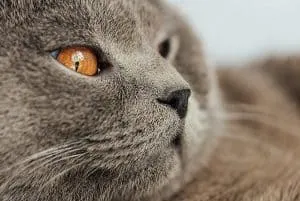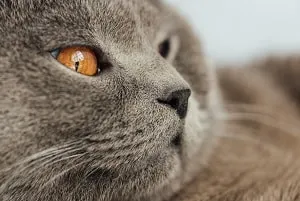 A cat’s whiskers serve many different purposes for our little furry friends. These thick, multi-colored hairs also add a delightful distinction to their sweet faces. But sometimes, we randomly find a cat whisker, or several, on our floor! It can seem a bit alarming. Is this normal? And what’s next? Do cat whiskers grow back?
A cat’s whiskers serve many different purposes for our little furry friends. These thick, multi-colored hairs also add a delightful distinction to their sweet faces. But sometimes, we randomly find a cat whisker, or several, on our floor! It can seem a bit alarming. Is this normal? And what’s next? Do cat whiskers grow back?
Yes, cat whiskers will grow back. A cat periodically shedding whiskers is normal. Whiskers are similar to hair in that respect. Whiskers are connected to sensitive nerve endings unique to their purpose. It’s essential not to clip whiskers yourself and to watch for excessive shedding of whiskers.
Whiskers have some similarities to human hair or animal fur. But in many respects, they serve complex functions and are unparalleled in their abilities! They guide cats in movement, emotion, and expression. In this article, we’ll take a deep dive into whiskers, what they do, when they’ll grow back, and why you should never, ever, clip them!
Why Do Cats Have Whiskers
Cat whiskers, also known as tactile hairs or vibrissae, act primarily as a navigational tool for cats. While they are, at their core, a form of hair, they are lively and vital pieces of a cat’s anatomy.
Kittens have whiskers from the moment of birth, and it’s the first way they start to become aware of their surroundings in the world. Sometimes, if a kitten starts to wander too far from the litter, a mother kitten will bite its whiskers to give the kitten a smaller moving range and keep them at home where they belong!
Sprouting from their face, eyebrows, and the backs of their legs, whiskers are variously-sized hairs that aid in spatial awareness, which is part of the reason your cat can squeeze through such tight spaces. Whiskers can also sense differences in the air current. This allows your cat to find their way around in the dark and sense the tiniest movements of potential prey or a string toy!
Much like the tail and ears, our kitty’s whiskers can give us a good indication of their mood. These fantastic little hairs contain muscles that allow them to move in response to different situations. Relaxed whiskers mean your cat is calm and comfortable, while whiskers angled forward indicate curiosity or, sometimes, anger. Whiskers pulled back against a cat’s face show us that the cat is scared or angry.
Whiskers are deeply embedded and connected to the cat’s nervous and muscular systems, which give them plenty of information. Some veterinarians have suggested that cats suffer from “whisker fatigue” if they feel tired or overstimulated. Though they are a form of hair, they are very different from human hair or animal fur!
How Long Do Whiskers Grow
The length of a cat’s whiskers varies greatly. Some cats, like Maine Coons, have very long whiskers to correspond with their large size. The world record for whiskers belongs to a Maine Coon, whose whiskers measured seven and a half inches long. Conversely, small cats, or cats with less hair, may have much shorter whiskers.
Cat whiskers are thicker at the base than at the tip. Studies show that this shape allows cats to have more sensitivity to their surroundings.
Why Do Cat Whiskers Fall Out
Whiskers can fall out for several reasons. The body sheds dead skin cells and hair naturally, and so sometimes whiskers have the same fate. Similarly to hair, whiskers will also grow back.
A cat’s whiskers can fall out in response to stress, another commonality with hair. If a cat has seen significant changes in their life, such as a new family member or moving to a new home, whiskers can be shed as part of the anxiety.
It is entirely normal for cat whiskers to fall out in moderation. However, if your cat is losing many whiskers in a short period, it could be due to an underlying condition. If you notice excessive whisker loss, contact your veterinarian.
What Happens If A Cat’s Whiskers Are Damaged Or Clipped
Even though whiskers will grow back, humans should never attempt to clip them or manipulate them in any way. Given their many functions and deep connection to the cat’s nervous system, clipping them will throw off a cat’s navigational skills. It would be similar to humans losing their senses of touch and direction.
All of the whiskers’ functions can become compromised if you clip them: Balance, sensory and navigational abilities, and the ability to sense and catch prey are all at stake. If you cut your cat’s whiskers and throw off their natural movement, they are also likely to become very scared by the new sensations they feel, adding emotional damage to the physical damage.
Sometimes cat whiskers can be damaged from playing too hard, getting too close to a candle and burning a bit off, or typical wear and tear. These things may affect your cat for a short time. If multiple whiskers are somehow lost, make sure to watch your cat for unusual balance or walking issues. If these things are present, be sure to keep extra lights on and keep your kitty from jumping or trying to get through small spaces. If your cat is an outdoor cat, be sure they’ve got plenty of access to food in case they struggle to catch prey.
How Long Does It Take A Cat’s Whiskers To Grow Back
As long as the cat is healthy, lost whiskers should grow back within two or three months. However, if there is an underlying condition, it will take longer or may not happen. If your cat’s whiskers are not growing back after two or three months or are continuing to fall out rapidly, it could be due to several conditions:
● Dermatitis, a skin condition that indicates an allergy
● Alopecia, a condition which causes the loss of multiple types of hair across your cat’s body
● Bacterial infections that cause reactions in the cat’s skin
● Fungal infections like ringworm.
● Feline acne
● Mite infestations
If your cat loses whiskers, it’s essential to monitor their behavior and whisker regrowth and talk to your veterinarian if things do not seem normal.
Can Cutting A Cat’s Whiskers Hurt Them
Cutting the cat’s whiskers will not hurt since, like hair, the nerve ending is at the hair’s root and not in the hair itself.
However, cutting the whiskers will result in discomfort for your cat, as they may temporarily lose their navigational abilities and instincts. This can lead to emotional distress. So while the actual cutting of the hair is not painful, the results very well might be.
Cats are full of magical fun, and whiskers are examples of what makes our feline friends so unique. They’re interesting little hairs and inform many things in our cats’ lives! Sometimes they may fall out, or something might happen to them, in which case it’s important to watch your kitty for unusual behavior. However, shedding is normal, and the whiskers will always grow back. Cats just aren’t cats without them!

My name is James, and welcome to FAQCats!
Along with our team of cat owners, expert pet enthusiasts, and pet professionals, we aim to write engaging helpful, engaging content about cats. At FAQCats we strive to provide content that’s accurate and fun to read. Our team writes about everything related to cats; even the most complex of topics. Through extensive research and caring for our own fur-pals, we’re able to provide something cat owners worldwide will love. Have a look around, and leave us feedback anytime!

